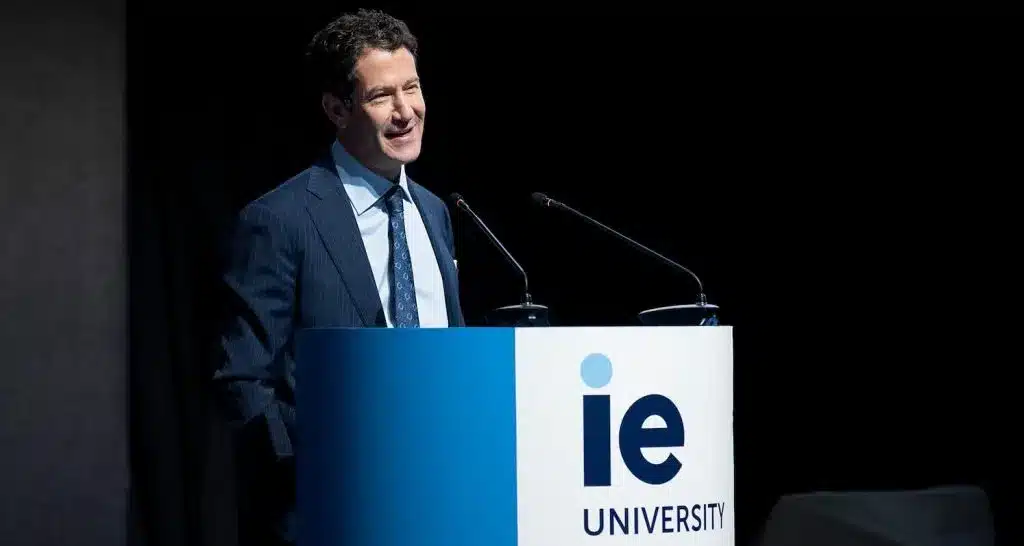Leadership in the world of education has never been an easy task, and the ever-evolving landscape of the field only adds to the challenge. I have been a dean for 10 years here at IE, in two different schools, and I have witnessed the excitement and the challenges that come with the role.
While it is always risky to say that today’s challenges are greater than those of the past, there is no denying that the winds of disruption are stronger than ever in the world of business education.
The 2023 EFMD Global Annual Deans & Directors General conference, hosted by IE Business School, brought together over 400 business school leaders from around the world to discuss and imagine the future of their institutions revolved around the theme “What if…? Reimagining the role of business schools in 2030”.
The two-day event, held at the IE Tower, was a unique opportunity for leaders in the field to reflect on the current challenges and opportunities and to collaborate towards a purposeful future. The conference was rich in diverse perspectives and ideas with participation from thought leaders such as Marta Machicot Arbizu (CPO, Telefonica), Dr Nick van Dam (McKinsey & IE University), Albert Triola (SVP, Oracle), Kiron Ravindran (Professor, IE Business School), Yolande E. Chan (Dean, Desautels Faculty of Management), Soumitra Dutta (Said Business School), Christina Soh (Dean, Nanyang Business School, and Manuel Muñiz (Provost, IE University).
As chair of this year’s conference, I would like to share with you my five takeaways:
A Radical New Workplace is Emerging
Humans starting to collaborate with AI and algorithms in the workplace is causing a massive transformation in how we work. AI-driven recruitment has major consequences for how business schools prepare their graduates for the job market and how they help students manage their online image and personal brand. With the rise of remote work and the increasing importance of technology in the workplace, it’s crucial that business schools adapt and stay ahead of the curve.
The Rise of the Project Economy
Companies are increasingly organizing work around projects and assigning talent based on specific skill sets. This shift is creating a new paradigm in the world of work, where individuals are no longer tied to a single employer but instead have the ability to work on a variety of projects. This new model creates both challenges and opportunities for business schools and their graduates, as it requires a different approach to job searching, career development, and skills acquisition. Business schools may need to align programs with the emerging skills maps that companies are developing.
Human Sustainability
It is essential that business schools equip their graduates with the knowledge and skills needed to create work environments that prioritize well-being, diversity, equity, and inclusion, and work-life balance where all employees can thrive. With the increasing emphasis on mental health and burnout in the workplace, it’s vital that business schools help their students understand the importance of sustainability in all aspects of their lives.
The Role of Business Schools in Society
Part of our mission ought to be to education the next generation of responsible, ethical and sustainability-focused business leaders who have the skill and the will to drive positive change for a better world. With the growing awareness of the need for sustainable business practices and the increasing importance of social responsibility, it’s crucial that we prepare our graduates to meet these challenges head-on.
Uniting a Fractured World
In light of growing political and social division, it’s paramount that we promote and safeguard critical thinking and civility through safe but uncomfortable classroom conversations and interactions. By fostering an environment of respect and open-mindedness, business schools can help bridge the gap and bring people together, creating a better future for all. It is more important than ever for business schools to play a role in promoting unity and understanding.
The 2023 EFMD Deans & Directors general conference was a valuable opportunity to address the pressing challenges and opportunities facing the business education industry. It served as a powerful catalyst for reflection and growth.
The insights and perspectives shared at the event serve as a call to action for us to come together and drive positive change for the benefit of society. We left with more questions than answers but also with a sense of purpose for how we must structure the future of business education.
NOTE: This article first appeared on the EFMD global blog at https://blog.efmdglobal.org/








